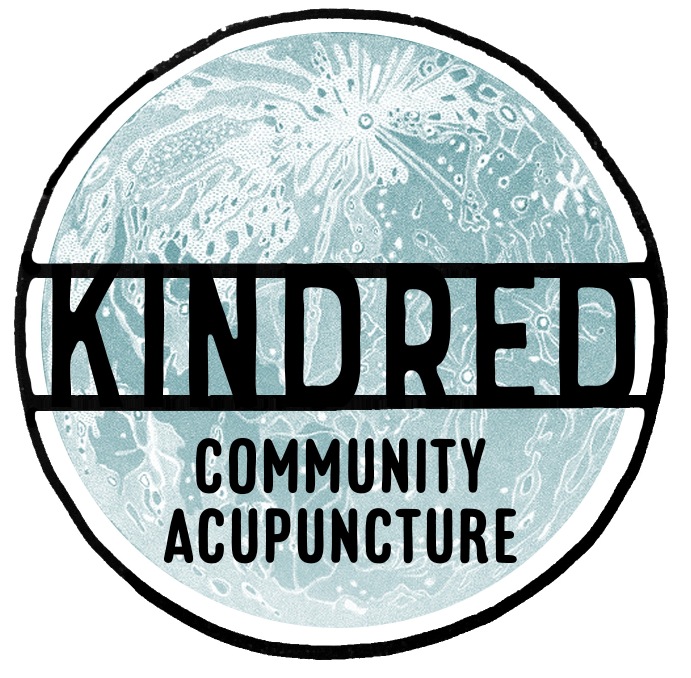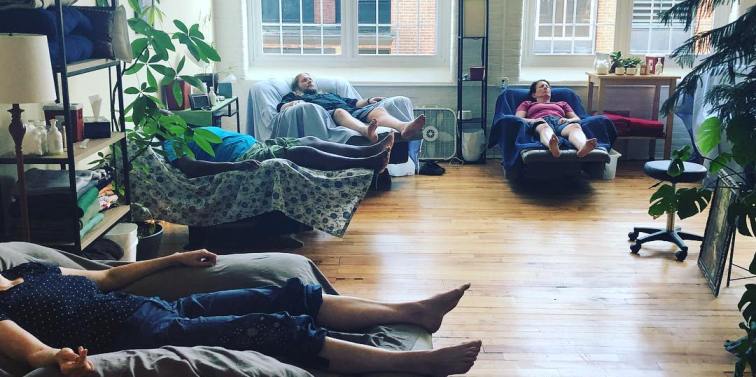Kindred Community Acupuncture, located in Pawtucket, is a place of welcome, healing, and peace. It aims to make the natural medicine of acupuncture a powerfully effective primary component in the lives of working-class individuals and their local communities by demystifying treatments, dramatically lowering their cost, and cultivating a common sanctuary of quiet and connection.
“Kindred is part of an international cooperative of community acupuncture clinics,” says founder Korben Perry. “We use a high-volume and low-cost community healing model to make regular acupuncture treatments an affordable and normal way for people of all socioeconomic communities to get healthy, stay healthy, and keep connected.”
Korben started Kindred because he believed that Chinese medicine could play an important role in people’s health and also provide an opportunity to bring communities together. He wanted to offer an alternative to the conventional boutique model of acupuncture in the United States, where clients are treated individually and in an isolated setting.
“We want to hold safe and healing space for all kinds of patients while creating jobs for people committed to making the powerful medicine of acupuncture affordable.”
His experience practicing as a member of Acupuncturists Without Borders in Louisiana after Hurricane Katrina showed him the advantages of a community-based model. “Thanks in large part to The Common Ground Health Collective, started by community organizers in a mosque in the Algiers section of New Orleans, the acupuncture we were offering for trauma and pain and respiratory health were able to reach lots of people,” he says. “What I discovered by treating people in makeshift spaces like sidewalks, community centers, and churches was that acupuncture performed in a group setting did not deter from its effectiveness, and it offered an additional quality to each patient – the opportunity of healing together in a safe, community setting.”
Korben also discovered what’s been known for centuries in China and Korea, and historically throughout various communities in the United States, including Asian immigrants and the Black Panthers and the Young Lords in New York City. “You can radically expand access to acupuncture by simplifying treatments and creating a desirable group space,” he says.
The SEG Network Effect
Korben founded Kindred knowing that the philosophy behind his practice was solid. He enrolled in SEG’s 2018 Health & Wellness Accelerator to make sure Kindred was on a sound organizational footing. “As you can probably tell, I am more of a community organizer than I am a business person,” he says. “I needed help cleaning up my systems and being able to more effectively understand and manage my financials.”
The Accelerator gave him the tools he needed. “What I found most useful was the rigor of getting together with other entrepreneurs every week,” he says, “and of being accountable to one another for making our best vision a viable ecosystem of relationships and organizational structures. I learned that I am the best spokesperson for my own ideas and the mission of my venture. I also learned that I can inspire others and mobilize support.”
His advice for other social entrepreneurs is to benefit from these kinds of relationships. “Make alliances,” he says. “Get people around you who are smarter and more experienced than you in all different kinds of ways. They not only can help you achieve your dreams, but you can be significant in helping them achieve their goals.”
Since 2018, Kindred has met several of its own goals and created a productive word-of-mouth referral system throughout working-class communities in Pawtucket, Central Falls, Providence, East Providence, North Providence, Lincoln, and Attleboro. By spring 2020, Kindred was providing between 80 and 100 sliding-scale acupuncture treatments per week, and had employed a second acupuncturist and two part-time administrators.
“We want to hold safe and healing space for all kinds of patients while creating jobs for people committed to making the powerful medicine of acupuncture affordable,” says Korben. “We judge our success on the level of effectiveness we achieve making acupuncture accessible to communities historically left out of the loop of boutique health experiences in the U.S. Specifically, we are committed to doing the ongoing work necessary to make our space and practices safe and liberating and healing for Black and Indigenous folks and other people of color.”
Just like many other health facilities, Kindred shut its doors temporarily in March due to the COVID-19 epidemic. Korben is staying abreast of new information and guidelines from the RI Health Department and the CDC as they evolve and is making preparations for clinic flow and practice and policies he will implement when Kindred’s doors open again. He is looking forward to seeing his patients, meeting new patients, and using his expertise to offer as much healing as he can. His customers are just as eager to return as he is to greet them.
“Acupuncture is a simple medicine that’s well suited to helping with trauma in all of its bodily manifestations,” he says, “and it’s also just a really good way to stay healthy. It should be available to everyone.”


